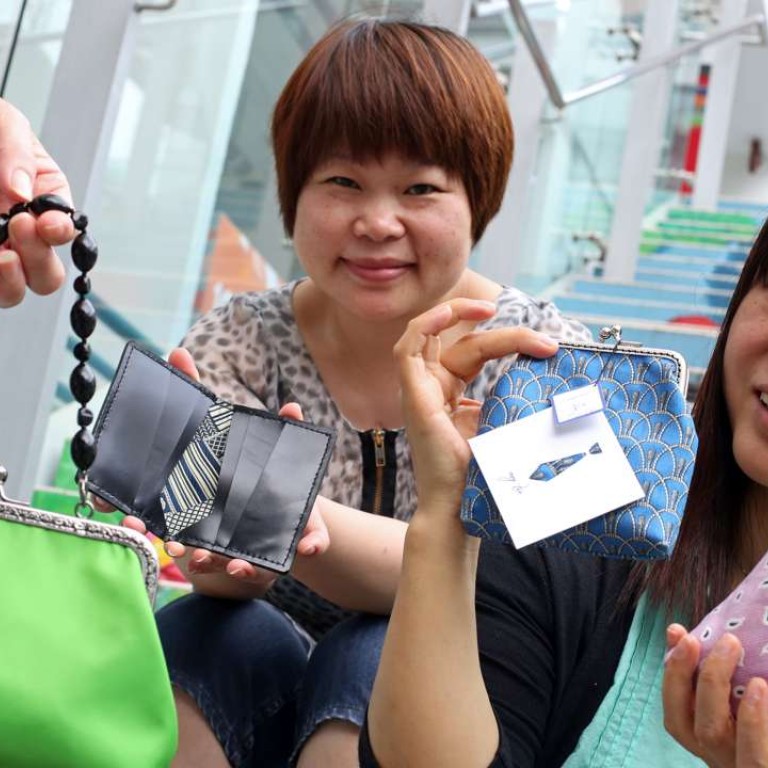
Unlocking Hong Kong’s hidden labour force: the social enterprise getting low-income mums back to work
A social initiative in which women make gift items from old ties while raising their children is helping to unlock a hidden labour force in the city
There was a time when little home factories set up across Hong Kong produced paper bags and plastic flowers to feed families.
And in the increasingly expensive city, one banker looked to that bit of local history and established a business making purses out of old ties – employing mothers from low-income families to do the work at home.
Margaret Leung set up social enterprise Les Beatitudes a year ago, with the concept of bringing work back into homes to make it easier for mothers, many of whom cannot find a job because they need to care for their children.
“It’s a dream of mine really ... to combine recycling, design and helping needy families,” says Leung. This working mode could be the answer to releasing the city’s hidden labour power – without compromising child-raising.
Women are paid slightly more than the minimum wage at HK$35 an hour. So a small purse that takes roughly two hours to make would bring in HK$70.

However, the job is much more flexible than a minimum wage job outside, which often involves long hours of menial work, says mother-of-two Huang Xiaoyun.
It is a luxury to be able to be a stay-at-home mother, but for Huang, it is not something she started doing by choice.
With two children aged eight and 12, she found she was only able to secure unstable part-time jobs at best.
Her husband works from 2pm to 2am and earns barely enough to provide for the family.
“I’ve tried to find jobs. I’ve worked as a home cleaner and also at a 7-Eleven, but because of the children none of them lasted long,” Huang says.
The opportunity to learn a skill and bring in a bit of income without neglecting her children was “really amazing”.
Les Beatitudes has trained and now employs 40 women like Huang, who make high-quality purses, small clutches and leather products.
“Yes, I’m happy about my work. It’s my own product and it’s money I’ve made myself,” says Huang. “If there is more work, I can really bring in the income for my family, and also care of my children.”
Single mother Du Kaiyun, who has a six-year-old son, says: “I hope more people will support what we’re doing, and that there will be more orders coming in.”
After realising that many women do not have space for a sewing machine at home, the company installed a sewing machine at a Society for Community Organisation centre in Sham Shui Po, and another in Wong Tai Sin, where mothers can get the machine-sewn bits done using shared equipment.
All ties are donated, says Leung, who picked ties because they are easy to store and also involve men in the programme supporting women. The mothers are paid once they’ve completed the work. The onus is then on Leung and her team to sell them.
The biggest order she’s had was 300 items for bank ICBC, and Leung hopes there will be more corporate orders. She also wants to expand to hotel gift shops.
“A lot of visitors to Hong Kong would want to buy something local made, so it would be great if hotel gift shops could carry local products like ours,” she says.
The company has recently been given display space at one of the Trade Development Council shops at PMQ in Central, and will be celebrating the mothers’ work today by bringing the women and their children and relatives to Central to see their work and have lunch.
Leung says the aim ultimately is to give the women a sense of dignity. Each item comes with a tag bearing the maker’s signature, with the women putting in a lot of thought and effort on their own “logo”.
“One of the mothers filled two A4-sized sheets of paper practising her signature before she signed her first tag – ultimately it’s about dignity and empowerment,” says Leung.
